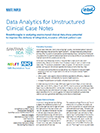 Clinical case notes are vital to delivering high-quality, coordinated patient care and optimising resources across the health economy. Yet case notes are unstructured and are often housed in incompatible record-keeping siloes, making the information unavailable for the sophisticated presentation and analysis that structured electronic medical record (EMR) systems can provide.
Clinical case notes are vital to delivering high-quality, coordinated patient care and optimising resources across the health economy. Yet case notes are unstructured and are often housed in incompatible record-keeping siloes, making the information unavailable for the sophisticated presentation and analysis that structured electronic medical record (EMR) systems can provide.
Advances in big data analytics show the potential to capture clinically and operationally relevant information from diverse sources of unstructured clinical case notes. This analysis, presented in easy-to-grasp, clinical decision-support portals, can support clinical and operational improve ments that may help:
- Provide a more comprehensive longitudinal view of patients' lives and health, enabling clinicians and organisations to deliver more personalised, higher quality care
- Offer system-wide opportunities to enhance operational efficiency, improve resource utilisation, and benefit the nation's health economy
- Increase the satisfaction and safety of patients and clinicians
A collaborative proof-of-concept (POC) amongst the North East London National Health Service (NHS) Foundation Trust (NELFT), Intel Corporation, and Santana Big Data Analytics (Santana BDA) Ltd has demonstrated a practical, affordable approach to extracting relevant information from large volumes of clinical case notes. This paper describes the POC and suggests next steps for healthcare systems that want to use next-generation data analytics to improve healthcare.
Download: Data Analytics for Unstructured Clinical Case Notes (.pdf, 706 KB).
Download from eHealthNews.eu: Data Analytics for Unstructured Clinical Case Notes (.pdf, 706 KB).